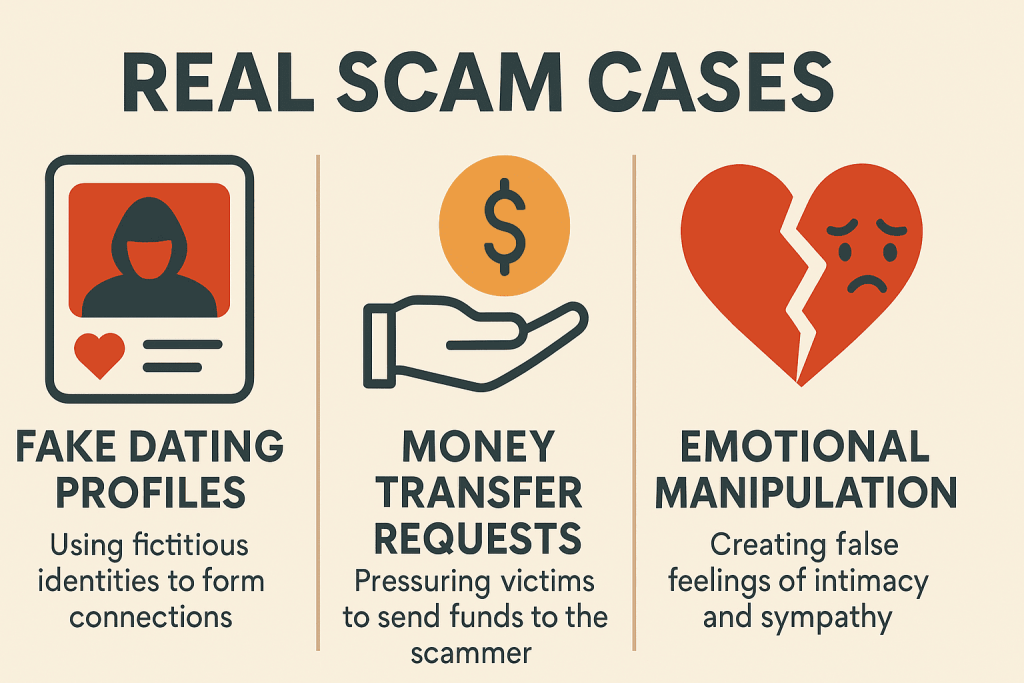In the ever-growing world of online dating, connections are just a click away but so are heartbreak and deception. Romance scams are among the most emotionally devastating and financially destructive forms of online fraud. Real people, from all walks of life, have fallen victim to sophisticated schemes that play on love, trust, and vulnerability.
This article explores romance scam stories, real scam cases, and dating fraud examples that reveal how these deceptions work, what victims experienced, and the key lessons we can learn to stay safe in a digital dating world.
Romance Scam Stories: When Love Turns into a Lie
Behind every headline about online fraud is a human story often of hope, trust, and heartbreak. These romance scam stories show how easily anyone can become a target.
Scammers don’t just steal money; they steal emotions. They spend weeks or even months building relationships before revealing their true motives. Each story below reflects a different kind of deception but shares the same outcome: betrayal disguised as affection.
Real Scam Cases: The Soldier Who Never Came Home
One of the most common real scam cases involves scammers posing as military personnel. They use stolen photos of real soldiers to gain credibility and exploit victims’ patriotism and sympathy.
Take the story of Linda, a 47-year-old nurse from Texas. She met “Mark,” a supposed U.S. Army officer deployed overseas. His messages were warm, respectful, and deeply romantic. Over several months, they developed what felt like a genuine bond.
Then came the “emergency.” Mark claimed he needed funds to process leave papers to visit her. When Linda sent $3,000, the requests didn’t stop there were “medical fees,” “communication costs,” and even a “customs payment.”
By the time Linda grew suspicious, she had sent nearly $20,000. The real soldier in the photos had no idea his identity was being used.
Lesson learned: Scammers exploit emotional connection and authority figures. Always verify identities, especially when someone claims to serve in the military but cannot meet in person or video chat.
Romance Scam Stories: The Businessman in Distress
In another one of the most well-known romance scam stories, a scammer posed as a successful international entrepreneur.
Rita, a 58-year-old widow, met “James” on a dating platform. He appeared charming, educated, and attentive. Their conversations revolved around family, travel, and shared values. After several weeks, James claimed he had to travel to another country for a big business deal.
Soon after, he said he was stuck overseas due to a banking issue and couldn’t access his funds. He promised to repay her as soon as he returned. Feeling emotionally connected, Rita transferred $15,000 to help him out.
He disappeared. His number stopped working, and his social media vanished.
Lesson learned: Scammers use false identities and create believable financial crises to exploit empathy. Genuine professionals will never request money from online acquaintances.

Dating Fraud Examples: The Doctor Who Needed Love
Among the most heart-wrenching dating fraud examples is the “medical professional” scam.
Sarah, a 39-year-old teacher, met “Dr. Alan” on a dating site. He shared photos of himself in scrubs, sent her flowers, and even called daily. He claimed to be working with a global health organization abroad.
After weeks of emotional bonding, Alan mentioned he needed to pay for shipping medical equipment back to the U.S. but couldn’t access his bank from overseas. Sarah, trusting his story, wired him $5,000.
When she later reverse-searched his photos, she discovered they belonged to a real doctor whose identity had been stolen.
Lesson learned: Scammers often use high-status professions doctors, engineers, or diplomats to appear trustworthy. Always verify credentials before believing such stories.
Real Scam Cases: The Crypto Romance Trap
Modern real scam cases have evolved with technology. Cryptocurrency and investment scams are the latest frontier in online romance fraud.
Kevin, a 32-year-old software engineer, met “Lina” through Instagram. She was friendly, tech-savvy, and shared his passion for investing. They chatted daily for months before she encouraged him to join her in a crypto trading group.
She even guided him through setting up an account on a fake investment website that appeared legitimate. Kevin invested $10,000 then another $25,000 after seeing “profits.” When he tried to withdraw his funds, the account vanished.
Lesson learned: Romance scammers are now blending emotional fraud with financial schemes. Never mix money or investments with someone you’ve only met online.
Romance Scam Stories: How Victims Are Groomed
The success of romance scam stories depends on one factor grooming. Scammers don’t rush; they carefully build emotional intimacy.
This grooming process involves:
- Consistent Communication – Daily texts and calls to build trust.
- Personal Sharing – Scammers share fake “personal struggles” to seem authentic.
- Emotional Dependency – Victims begin to rely on the scammer for companionship.
- Crisis Creation – Once emotionally attached, the victim is asked for help.
These steps are meticulously planned to exploit human psychology. The victim isn’t gullible — they’re emotionally conditioned to believe in the relationship.
Dating Fraud Examples: The Social Media Impostor
Some of the most deceptive dating fraud examples happen on social media, not just dating apps.
Tom, a university student, met “Emily” on Facebook. Her profile was full of photos, friends, and activity everything seemed real. Over time, they exchanged messages, jokes, and plans to meet.
When Emily said her car broke down and needed $400 for repairs before visiting, Tom helped. Then she needed another $200 for “travel costs.” After the third request, Tom hesitated. A reverse image search revealed her profile photos belonged to a model.
Lesson learned: Social media profiles can be easily faked. Don’t assume authenticity just because an account looks active.

The Human Side of Real Scam Cases
Beyond the statistics and warnings, these real scam cases reveal something profoundly human: our deep need for connection. Victims often describe how the scammers made them feel valued and seen emotions many hadn’t experienced in years.
This emotional vulnerability is what scammers prey upon. They study psychology, mimic affection, and manipulate empathy. It’s not about intelligence; it’s about emotion.
Lessons Learned from Romance Scam Stories
The most powerful takeaways from romance scam stories and dating fraud examples are universal:
- Verify Before You Trust – Use reverse image searches or video calls early in communication.
- Avoid Sending Money – No legitimate relationship requires financial support from someone you haven’t met.
- Slow Down – Real connections grow over time. Love bombing and fast emotional attachment are red flags.
- Be Private – Avoid sharing personal or financial details until you’ve met face-to-face.
- Trust Intuition – If something feels too perfect, it probably isn’t.
Awareness and patience are the strongest defenses against online dating fraud.
Dating Fraud Examples: Rebuilding Trust After a Scam
Recovering from dating fraud examples isn’t easy. Victims often experience heartbreak, shame, and distrust. But recovery is possible.
Experts recommend focusing on:
- Self-compassion – Remember, you were targeted because of your empathy, not ignorance.
- Education – Understanding how scams work helps prevent future harm.
- Support – Join online communities for scam survivors to share stories and heal.
Awareness turns pain into protection for yourself and others.
Moving Forward: Awareness and Prevention
Every one of these romance scam stories highlights the importance of education and safe digital practices. Technology will continue to evolve, but human emotions remain constant and scammers know that.
By sharing real scam cases and lessons learned, we empower others to recognize the warning signs and protect themselves from emotional and financial harm.
Final Thoughts: Building a Safer Future for Online Dating
Romance scams expose more than deceit they reveal how deeply people crave love and connection. The solution isn’t to avoid online dating but to approach it with awareness, caution, and authenticity.
Trusted and True is the first dating platform truly dedicated to eliminating fake profiles, bot scams, and catfishing.










